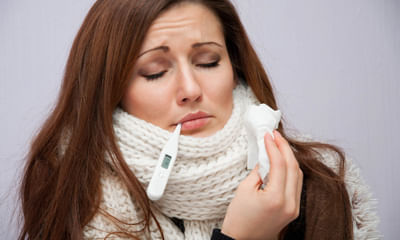Fever in Children And Home Remedies
Fever remains the most common concern prompting parents to present their child to the emergency department. Fever has traditionally been defined as a rectal temperature over 100.4 F or 38 C. Temperatures measured at other body sites are usually lower. The threshold for defining a fever does vary significantly among different individuals, since body temperatures can vary by as much as 1 F. Low-grade fevers are usually considered less than 102.2 F (39 C).
Fever itself is not life-threatening unless it is extremely and persistently high, such as greater than 107 F (41.6 C) when measured rectally. Risk factors for worrisome fevers include age under 2 years (infants and toddlers) or recurrent fevers lasting more than one week. Fever may indicate the presence of a serious illness, but usually a fever is caused by a common infection, most of which are not serious. The part of the brain called the hypothalamus controls body temperature. The hypothalamus increases the body's temperature as a way to fight the infection. However, many conditions other than infections may cause a fever.
Fever in Children - Causes:
Causes of fever include:
- Bacterial infections
- Viral infections, like influenza (the "flu")
- Medications
- Illicit drugs
- illnesses related to heat exposure
- Allergies
- Rarely, inflammatory diseases
When to seek medical care:
- The child is younger than 6 months of age (regardless of prematurity).
- One is unable to control the fever.
- One suspects a child may become dehydrated from vomiting, diarrhea, or not drinking (for example, the child has sunken eyes, dry diapers, tented skin, cannot be roused, etc.).
- The child has been to a doctor but is now getting worse or new symptoms or signs have developed.
Although you may have done your best to care for your child, sometimes it is smart to take your child to the emergency department. The child's doctor may meet you there, or the child may be evaluated and treated by the emergency doctor.
Take a child to an emergency clinic when any of the following happen:
- One has serious concerns and is unable to contact the child's doctor.
- One suspects the child is dehydrated.
- A seizure occurs.
- The child has a purple or red rash.
- A change in consciousness occurs.
- The child's breathing is shallow, rapid, or difficult.
- The child is younger than 2 months of age.
- The child has a headache that will not go away.
- The child continues to vomit.
- The child has complex medical problems or takes prescription medications on a chronic basis (for example, medications prescribed for more than two weeks' duration)
Home Remedies for Fever in Children:
The three goals of home care for a child with fever are to control the temperature, prevent dehydration, and monitor for serious or life-threatening illness.
- The first goal is to make the child comfortable by reducing the fever below 102 F (38.9 C) with medications and appropriately dressing the child. A warm water bath can also be helpful .
- To check a child's temperature, one will need a thermometer. Different types of thermometers are available, including glass, mercury, digital, and tympanic (used in the ear).
- Glass thermometers work well but may break, and they take several minutes to get a reading.
- Digital thermometers are inexpensive and obtain a reading in seconds.
- Oral temperatures may be obtained in older children who are not mouth breathing or have not recently consumed a hot or cold beverage.
- Monitoring and documenting the fever pattern is achieved using a thermometer and a handmade chart.
- Acetaminophen and ibuprofen are used to reduce fever.
- Follow the dosage and frequency instructions printed on the label.
- Remember to continue to give the medication over at least 24 hours or the fever will usually return.
- Children should not be overdressed indoors, even in the winter.
- Overdressing keeps the body from cooling by evaporation, radiation, conduction, or convection.
- The most practical solution is to dress the child in a single layer of clothing, then cover the child with a sheet or light blanket.
- A sponge bath in warm water will help reduce a fever.
- Such a bath is usually not needed but may more quickly reduce the fever.
- Put the child in a few inches of warm water, and use a sponge or washcloth to wet the skin of the body and arms and legs.
- The water itself does not cool the child. The evaporation of the water off the skin cools the child. So, do not cover the child with wet towels, which would prevent evaporation.
- Contrary to the popular folk remedy, never apply alcohol in a bath or on the skin to reduce fever. Alcohol is usually dangerous to children.
- The second goal is to keep the child from becoming dehydrated. Humans lose extra water from the skin and lungs during a fever.
- Encourage the child to drink clear fluids but without caffeine (and not water). Water does not contain the necessary electrolytes and glucose. Other clear fluids are chicken soup, other rehydrating drinks available at the grocery or drugstore.
- A child should urinate light-colored urine at least every four hours if well hydrated.
- If diarrhea or vomiting prevents one from assessing hydration, seek medical attention.
- The third goal is to monitor the child for signs of serious or life-threatening illness.
- A good strategy is to reduce the child's temperature below 102 F (39 C).
- Also, make sure the child is drinking enough clear fluids .
- If both these conditions are met and the child still appears ill, a more serious problem may exist.
- If a child refuses to drink or has a concerning change in appearance or behavior, seek medical attention.



+1.svg)
